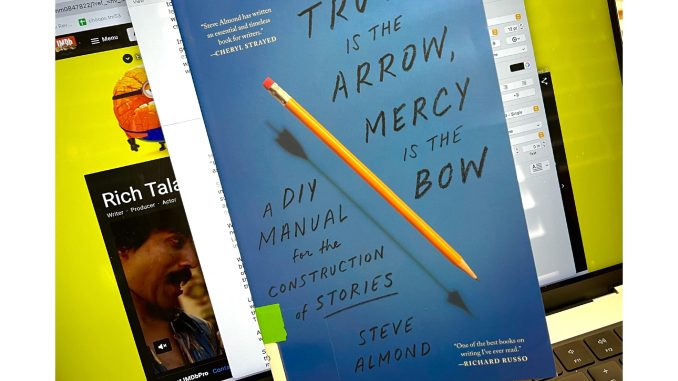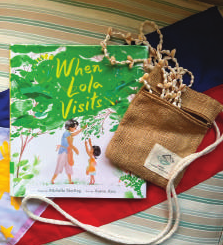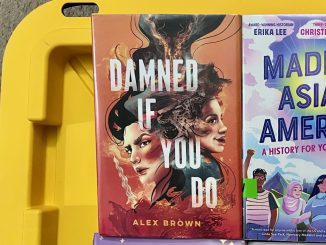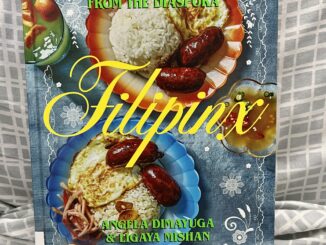
Truth is the Arrow, Mercy is the Bow – A DIY Manual for the Construction of Stories
By Steve Almond
Paperback, 235 pages, 2024.
Zando
GET THE BOOK – https://amzn.to/3UgEc50
I recommend you visit the library to check out books. If you buy your own copy, I can earn a small commission if you use my Amazon affiliate link.
Wow. This is the first book on writing that I enjoyed. Most writing books sound like they’re teaching you how to pompously cook an egg but Steve really entertained me.
Steve is the consummate writer. An investigative journalist (two impressive words that connote lots of care, research, and fact-checking to expose a bad guy, pursue an obsession, and avoid a lawsuit), he has written fiction and nonfiction books, short stories, and serious stuff that make him legit. He has struggled as a poet and admits he sucks at plot.
In this book, Steve says he’s “a neurotic striving to sound sure of himself.”
Now he teaches writing to the elite winners of the Harvard lottery or legacy.I was impressed with Steve’s vivid writing and fresh voice, meaning I did not encounter a single cliché nor cringe expression. He’s not trying to be funny, which guarantees you won’t be funny, so I found his well-earned self-effacing advice amusing.
Neither does he sound like he alone cracked the Ultimate Secret to Writing that Everyone Must Follow. I hate that tone. But he’s accomplished enough to acquire that conceit (I use this conceited use of the word to show you how HE doesn’t sound conceited) yet he opts to just be confidently chill. That’s because, unlike the empty braggarts, Steve has nothing left to prove. He’s done it all and went through Hell.
As only a veteran professional can do, Steve casually indoctrinates readers to the Poetics of Aristotle as he weaves examples of his favorite works into a lesson. We aren’t made to suffer the pompous pretensions of an academic who has no real-world cred yet we learn about classics and masters of the craft. If only all teachers and priests could be like Steve.
Instead of hack To Do Lists from self-aggrandizing one-time authors, Steve gets to the gut of each element of story and reveals how to effectively execute it. What makes a great plot and character; How to hook a reader with the first line; How to be a great Narrator; and other elements that all writers struggle with.
My favorite chapter is on comedy where Steve nailed its essence. “Remember, your sense of humor did not begin as a narrative strategy but as an adaptive instinct.” Comedy is a way of dealing with our Tragedy.
Steve fights for the Truth in writing, whether it’s buried in doubt or shrouded in shame. “We always turn away from unbearable feeling. We want to feel sure of ourselves. We want to skip the part of the story where the hero falls apart. It’s an instinct. But that’s the story the reader wants to hear, the one only another human being in pain can tell them.”
While most writing books don’t need to be reread nor written, Steve’s book needs to be studied, marked, revisited, contemplated, and disseminated. Like the author, this writing book is unassumingly wise and eloquently insightful.
We are so fortunate that Steve gifted us with his teachings— precious gems bled from his torture and pain. I only trust writers who have run the course of angst, defeat, and desperation, yet have tried, faltered, and failed. For they are the only ones who have earned the badge of Teacher to tell us how they got their battle scars in writing.
Like every creative endeavor, writing is a struggle, mostly with the fallacies we tell our Self. Writers like Steve battle their demonic self-destruction. But this Sisyphian task is still a worthy pursuit for those who are called to write. That’s why my comedy guru Rich Talarico calls writers Poet Warriors.
And so, like Steve, we must fight on to tell our Truth. Especially now when we are deluged with lies at every media corner.
Steve says, “Literature’s mission is just the opposite. Its narrators represent the human capacity to confront truth and find meaning. They activate our imaginations so that we can discover ourselves in the act of reading. We are, in the end, a product of the stories we tell.”
— Ivy Lopez (@IvyDigest)
Ivy is a lawyer turned columnist who writes comedy on YouTube @HumorMeIvy.
.
.







